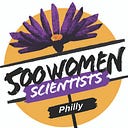Promote Decarbonization of the Transportation Sector
The 500 Women Scientists Philly Pod went to Harrisburg, PA on November 18, 2019, and lobbied for a number of important issues. These one-pagers were given to our representatives outlining our recommendations.
Transportation is vital to people’s lives, livelihoods, and the economy. Transportation also is a major contributor to greenhouse gas (GHG) emissions that are driving climate change globally and decreasing air quality locally.[1] Pennsylvania has recently joined the Regional Greenhouse Gas Initiative[2] intended to reduce GHG emissions from the power sector, and is participating in developing the framework for the Transportation & Climate Initiative.[3] Together, the power and transportation sectors make up greater than 60% of GHG emissions in Pennsylvania.1 Consistent with the goals of both initiatives and as part of a holistic approach to reducing GHG emissions for climate change mitigation, the transportation sector needs to decarbonize.
There are a variety of approaches to do so, including technological advances and changing land-use strategies.[4,5]
- Fuel switch or increase fuel efficiency
- Change purchase behavior with incentives
- Reduce travel demand
- Increase accessibility and reliability of public transportation powered by clean energy
- Encourage higher density development in conjunction with public transportation
We, the 500 Women Scientists Philadelphia Pod, strongly encourage efforts to curb fossil fuel use in the transportation sector, and make recommendations to this end.
Support Pennsylvania’s participation in the Transportation Climate Initiative and incentivize decarbonization.
The Transportation & Climate Initiative (TCI)3 is an effort by twelve states in the Northeast, including Pennsylvania, and the District of Columbia, to collectively reduce GHG emissions in the transportation sector, and in doing so, develop a strong and clean economy for the region. This initiative is still evolving and signing by Pennsylvania of the Memorandum of Understanding (expected Spring 2020) is not guaranteed.
Our recommendations:
✳ Support participation of Pennsylvania in the Transportation & Climate Initiative and signing the MOU
✳ Incentivize EV use through infrastructure improvements and disincentivize use of combustion engine vehicles through gas or congestion taxes
Vote against HB 1392 Amending Title 75 regarding Electric Vehicle Road Use Fee.
Acquisition of electric vehicles (EV) by Pennsylvania residents should be incentivized rather than discouraged via this proposed road use tax. EV owners already face infrastructure difficulties through the lack of charging stations, both for long-distance trips and in urban areas such as Philadelphia where a moratorium has been placed on privately installing charging stations on the streets.[6]
Our recommendations:
✳ Vote against HB 1392
Cosponsor HB 1908 Amending Uniform Construction Code to include Electric Vehicle charging stations.
Acquisition of electric vehicles (EV) by Pennsylvania residents should be incentivized rather than discouraged via the road use tax proposed in HB 1392. We support updating the Uniform Construction Code requiring private businesses and property owners with parking lots to install EV charging parking spaces commensurate with the volume of the lot.
Our recommendations:
✳ Cosponsor HB 1908 or introduce a companion bill in the Senate.
References
- Saha, D. and Lashof, D. (2019). Pennsylvania is Joining RGGI. Here’s Why That Matters. [online] World Resources Institute. https://www.wri.org/blog/2019/10/pennsylvania-joining-rggi-heres-why-matters [Accessed 29 Oct. 2019].
- Regional Greenhouse Gas Initiative. https://www.rggi.org/
- Transportation and Climate Initiative. https://www.transportationandclimate.org/
- US EPA. (2019). Sources of Greenhouse Gas Emissions | Transportation. https://www.epa.gov/ghgemissions/sources-greenhouse-gas-emissions [Accessed 29 Oct. 2019].
- Sims R., R. Schaeffer, F. Creutzig, X. Cruz-Núñez, M. D’Agosto, D. Dimitriu, M.J. Figueroa Meza, L. Fulton, S. Kobayashi, O. Lah, A. McKinnon, P. Newman, M. Ouyang, J.J. Schauer, D. Sperling, and G. Tiwari, 2014: Transport. In: Climate Change 2014: Mitigation of Climate Change. Contribution of Working Group III to the Fifth Assessment Report of the Intergovernmental Panel on Climate Change [Edenhofer, O., R. Pichs-Madruga, Y. Sokona, E. Farahani, S. Kadner, K. Seyboth, A. Adler, I. Baum, S. Brunner, P. Eickemeier, B. Kriemann, J. Savolainen, S. Schlömer, C. von Stechow, T. Zwickel and J.C. Minx (eds.)]. Cambridge University Press, Cambridge, United Kingdom and New York, NY, USA, Available at: https://www.ipcc.ch/site/assets/uploads/2018/02/ipcc_wg3_ar5_chapter8.pdf.
- Phila.legistar.com. (2018). City of Philadelphia — Bill 180218. https://phila.legistar.com/LegislationDetail.aspx?ID=3373006&GUID=D95FD8DD-624C-4899-BEF9-667E5CCB3353&Options=ID|Text|&Search=electric+vehicle [Accessed 29 Oct. 2019].
